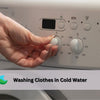How to Wash Pillows the Right Way
- by Brodie Cook
Do your pillows feel heavy, lumpy, or have a strange smell? It's probably time to wash them! Pillows collect sweat, oils, dust, and dead skin cells over time. I'll teach you the proper way to wash pillows at home. You'll learn how to wash, how often, what cycle to use, and other helpful tips
Also, be sure to regularly wash your pillowcases as well. Refresh them frequently for a long-lasting cleaner pillow.
Can pillows be washed in the washing machine?

Yes, most pillows are machine-washable. But first, always read the care label for instructions. Some pillows say "hand wash only." For machine washing, use a gentle cycle with warm water.
Don't overload the machine with too many pillows at once. They won't get fully clean. Wash just a couple of pillows together. Also, use a mild detergent like our laundry detergent sheets. Regular detergent can damage pillow fabric and filling. If you have a top-loading machine with an agitator, place the pillows in the tub vertically to lessen the chance of them getting damaged.
And don't forget the extra rinse cycle! This helps remove all soap from the pillows. You don't want soapy, smelly pillows on your bed.
How to Wash Pillows with a Washing Machine
When you are about to throw your pillows in the washing machine, try to use a front-loading machine. This helps prevent damage to the pillows since it doesn't have an agitator.
*An agitator is a spindle or mechanism in the centre of some washing machines that moves clothes around to clean them more effectively. Often seen in Top Load Washers.
For machine washing pillows:
- Use a gentle cycle and warm water. Hot water is too harsh.
- Add a mild, liquid detergent made for delicates, or try detergent sheets. Avoid powder detergents as they are harsher on the environment compared to detergent sheets.
- Wash just 1 or 2 pillows at a time. Overcrowding prevents cleaning.
- Run an extra rinse cycle. This removes all soap residue.
- Tumble dry on low heat or air dry pillows completely.
Following these simple steps keeps pillows fresh and fluffy for a good night's sleep.
How to Hand-Wash Pillows
Some pillows need to be hand-washed based on their care label. Follow these steps:
- Fill a bathtub or sink with warm water and use a detergent sheet to dissolve in the water.
- Submerge the pillows and gently squeeze to release dirt and oils. Rinse and repeat this step.
- Drain the soapy water and refill with fresh, warm water for rinsing.
- Squeeze the pillows gently in the clean water to remove all soap.
- Press out excess water carefully, but do not wring or twist.
- Lay the pillows flat to air dry completely before using them again.
Hand-washing takes more effort, but you must do it for delicate pillows. Be very gentle!
Spot Cleaning Your pillows as needed

In between full washings, you may need to spot-clean your pillows. Maybe you spilled something or had a bit of drool. Don't worry!
For fresh stains, blot the area with a clean, damp cloth. You can also use a small amount of mild detergent. Gently rub to lift the stain.
For dried stains, make a baking soda paste with water. Gently scrub the paste onto the stain using a soft brush. Let it sit briefly before wiping it away.
Spot cleaning keeps pillows looking and smelling fresh between washings. Do it as soon as you notice any messes or discolouration.
How to Remove Odour Issues From Pillows
Do your pillows have an unpleasant, musty smell? There are some easy ways to freshen them up and remove odours.
First, try sprinkling baking soda generously over the pillows. Let it sit for several hours to absorb odours before vacuuming up the baking soda.
You can also expose your pillows to the sun outside. The UV rays help kill odour-causing bacteria. Just lay the pillows in direct sunlight for 3-4 hours, flipping halfway.
For tough smells, mix a solution of 1 part white vinegar to 3 parts water. Lightly mist this solution onto the pillows and allow to fully dry before using again.
Washing pillows also prevents odours by keeping them clean. You can use deodorisers when needed.
Washing Different Types of Pillow
How to Dry Your Pillows Properly

After washing your pillows, drying them correctly is very important. If not dried fully, pillows can develop mildew or odours.
For pillows that can go in the dryer, use the low heat or air dry setting. High heat can damage the filling. Tip: Toss a few clean tennis balls in the dryer. This helps fluff up the pillows and prevent clumping of the filling.
If air drying pillows, lay them flat or hang them. Flip and fluff frequently during drying to maintain shape. It may take 24 hours or longer for pillows to dry completely. Be patient and check for any remaining dampness before using.
Proper drying keeps pillows fresh, fluffy, and free of mildew. Take your time with this important last step.
How Often Should Pillows be Washed?
You may not think about it, but pillows need regular washing. They quickly get dirty from sweat, oils, dust, and dead skin cells. Experts say you should wash pillows every 3 to 6 months at the minimum. If you have allergies or skin issues, wash monthly.
For pillows used by multiple people, like guest room pillows, wash after each set of visitors leaves. It's also smart to wash pillows promptly if someone has been sick. This prevents the spreading of germs or illness.
Don't wait until pillows look dirty or smell bad. Set a schedule to keep them fresh and clean. Regular pillow washing is better for sleep hygiene and makes pillows last longer too.
Regular Pillow Maintenance
In addition to washing, there are some simple things you can do to keep your pillows fresh and lasting longer.
Use pillow protectors or covers. These create a barrier against sweat, drool, oils and dirt reaching the actual pillow.
Fluff and rotate your pillows daily when making your bed. This helps maintain their shape and evenly distributes body oils.
Air pillows outside occasionally. The sunlight helps kill bacteria and dust mites, while fresher air removes odours.
Check pillows for yellowing, lumps or lost fluffiness. These are signs it's time to replace with new pillows.
With some basic care between washings, your pillows will stay cleaner and more comfortable for a good night's sleep.
When to Replace a Pillow
Even with regular washing, pillows won't last forever. Here are signs it's time to replace yours:
- Lumpy or misshapen pillows provide poor support. The filling has broken down and can't be fixed.
- Staining that won't come out, even after washing. This indicates deep-set dirt and oils you can't remove.
- An unpleasant odour that lingers after cleaning. It likely means bacteria or mildew have set in.
- Visible tears, rips or leaking filling from the pillow's outer casing. Patching these is only a temporary fix.
Most pillows need replacing every 2-4 years with normal use. Splurge on fresh, supportive new pillows for better sleep quality.
Ensure that you also wash and maintain your other bedding items, not only the pillows. Here are some articles that might help you
For Sheets:
Frequently Asked Questions Related to How to Wash Pillows
Can I wash foam pillows in the washer?
If it says on the care label that it can, then yes, foam pillows can be washed in the washing machine.
How often should I wash my memory foam pillows?
It is recommended to wash memory foam pillows may need some deep cleaning every three to six months to keep them fresh and clean. It's best to hand wash these.
Can I place the pillows in the washer along with my pillow covers?
Yes, you can wash your pillows along with your pillow covers in the washer for a thorough cleaning.
Should I wash two pillows at a time or separately?
It is best to wash two pillows at a time to balance the load in the washer for efficient cleaning.
What is the best way to dry pillows after washing?
It is recommended to dry pillows on a no-heat or low-heat setting in the dryer. Adding dryer balls can help fluff the pillows.
How can I ensure my memory foam pillows last longer?
To ensure your memory foam pillows last longer, follow the care instructions, wash them regularly, and avoid high heat during the drying process.
Is it safe to wash fibrefill pillows in the washer?
Yes, fibrefill pillows can be washed in the washer. Be sure to use a gentle cycle and mild detergent for best results.

 Dishwashing
Dishwashing Laundry
Laundry Bundles
Bundles Surfaces
Surfaces Toilet
Toilet Handsoap
Handsoap Multi-Purpose
Multi-Purpose Floor
Floor



